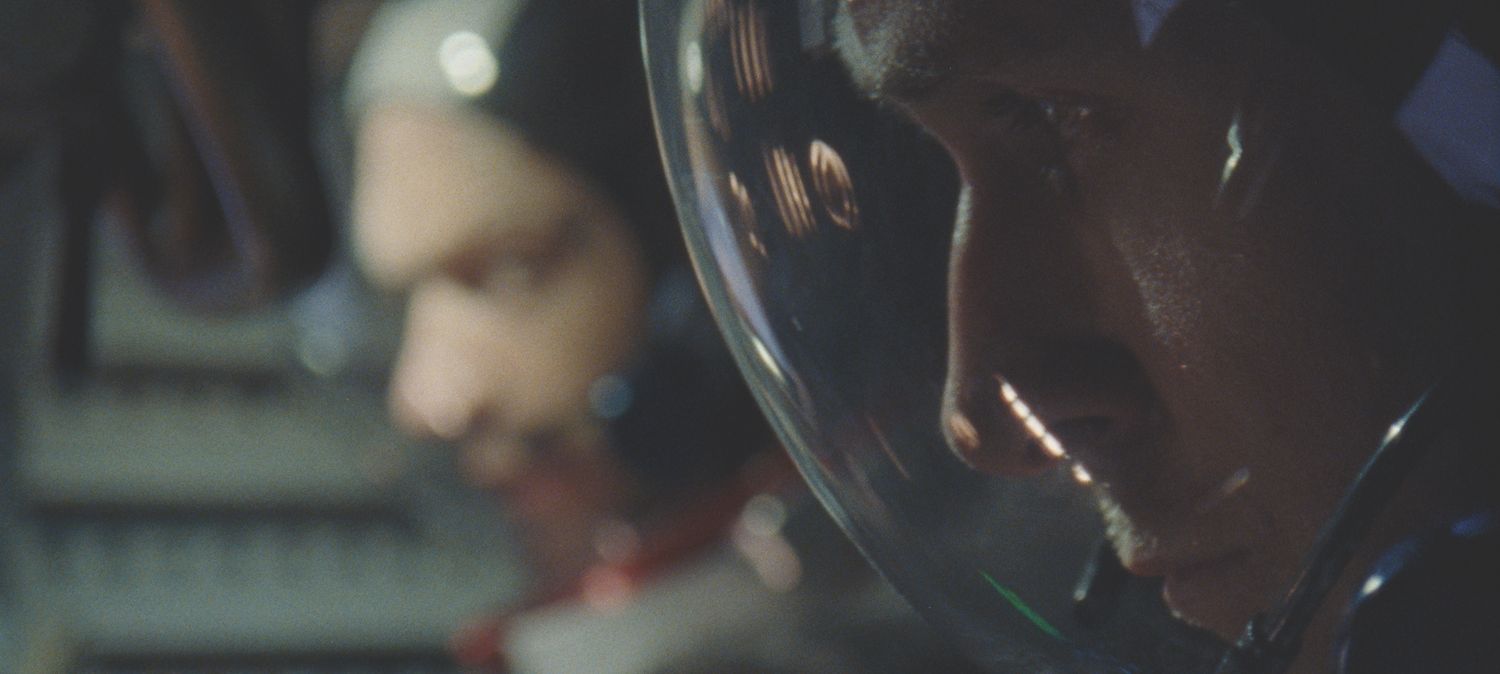First Man restores the majesty to a now-familiar historical feat by taking the mythmaking away. It tells the story of the early days of the space race through a focus on Neil Armstrong, first man on the moon, without overt triumphalism, Great Man hero worship, or blind hagiography. Here even the eventual, historically inevitable shots of the lunar landscape is scored with a rolling music cue as theremin eerie as it is orchestral fanfare. In the hands of screenwriter Josh Singer (Spotlight, The Post) it is another of his period pictures of professional process. In the eyes of director Damien Chazelle (Whiplash, La La Land) it is another of his pictures of lonely, single-minded ambition. Together, it's a story of a group of square-jawed engineers and test pilots determined to make it to the moon, almost no matter the cost. This makes the movie one of vulnerability and frailty, of risk and fear, of rickety rides and stifling odds. The whole thing is as emotionally distant and buttoned-up as its vision of Armstrong -- terse, determined, resisting overt sentimentality, bearing the stress and strain of life internally as the job's methodical danger bears down upon him.
After countless reenactments of the space race over the last several decades -- Countdown and The Right Stuff, and Apollo 13, and From Earth to the Moon, and Hidden Figures, and, and, and... -- the craft of First Man nonetheless avoids feeling overfamiliar. It finds a visceral, intense, scary perspective. With a shaking camera, grainy film stock, and overwhelming sound design, the emphasis is on groaning metal sheets and straining bolts, the head-splitting roar of rocket engines and howling headwinds. The images quake and smear. The speakers hammer with rattles and hums. As the film patiently catalogues NASA's early tests and training, each step of the journey to the moon tested and tried before all coming together for the seemingly improbable goal, it quickly and crisply falls into a patter of stoic silences and storms of jargon. A large ensemble of character actors -- Kyle Chandler, Ciaran Hinds, Christopher Abbott, Ethan Embry, Corey Stoll, Jason Clarke, Shea Whigham, and more -- congregate in scenes crackling with verisimilitude. But it's not about any one man. It's about the effort, the group, and the ways in which they work and work upon Armstrong. They're just another factor in the process by which one man gets to his destination.
Ryan Gosling plays Armstrong as the troubled quiet in the middle of the ensemble and the noise. He's a square figure, a prototypical mid-century all-American white bread family man, lost in his work, distant from his home life, uncommunicative about his deep feelings, uncomfortably wrestling to keep his psychology resolutely hidden behind a tough masculine idea. His tension-wrecked family feels the strain of his work's enormous risks, and feels the incessant tug of mourning. There's a haunted feeling to the distance between the evocative broad strokes and needling Malickian suburban expressionism and the crisp drumbeat of NASA protocol. Armstrong's wife (Claire Foy, doing more than could be expected with a very thinly drawn role) does what she can to support him and hold the family together. (Their dopey boys run through oblivious, until a tense family meeting pre-final flight.) But the family is firmly ensconced in a narrative that turns them up at funerals with grim regularity. As the film begins, they lose a child. Throughout, they lose friends to crashes and botched launch tests. There's a constant reminder of how fragile a human life is in the best of circumstances, and it's a fragility that only grows when launching into the air on the tip of a spewing machine's searing flames and billowing smoke.
In its final sequence, Chazelle and Singer draw the film's preoccupations together in one clear, clean, confident evocation of the small step for man, the giant leap for mankind. It's a success, though the telling restores some of the suspense. The astonishing recreation feels more humbling and miraculous for how small and cold the careful setup. The film resists easy triumph. The way there injects more than a dose of contemporary skepticism, not just from the engineers who are problem-solving, a man writing a potential obit speech for the president to read, and babbling congressmen blathering about taxes, but from Gil Scott-Heron's "Whitey on the Moon," too. By the time Armstrong contemplates his feet on the powdery lunar surface, a moonwalk is a much an act of mourning as professional catharsis. Here he is, accomplishing a scientific marvel, as far from Earth as anyone has ever been, where he finally can, in some small way, find himself closer than ever to his interior life. Is that the case? Who knows? But it makes a certain metaphoric sense for humanity. Getting to the moon took extraordinary cooperation, timing, and luck. Would that we get to that place again. In its improbability, its beating the long odds for the sake of it, is its greatest beauty. And that is the majesty.


No comments:
Post a Comment